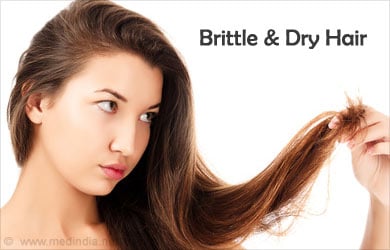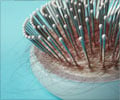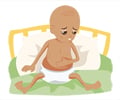- Is your hair dry and brittle? You might be experiencing the early stages of female hair loss - (http://www.nicehair.org/featured/is-your-hair-dry-and-brittle-you-might-be-experiencing-the-early-stages-of-female-hair-loss)
What is Brittle and Dry Hair?
The hair that grows on our body and scalp is deeply rooted in the skin at its base. It undergoes a continuous cycle of growth, and is replaced by the root when the older hair falls off. Hair Growth depends on a number of factors like nutrition, hormones, age and physical health. The hair texture is maintained by sebum that is secreted into the root by the sebaceous glands. Though loss of hair or lack of texture does not have any serious impact, it does have a cosmetic effect, which is important for most of us.

Hair is made up of a protein called keratin and its texture is maintained by sebum, which is an oily substance consisting of fat. Some of the dietary contents that are necessary for healthy hair are:
- Protein, which contributes to the main structure of the hair
- Vitamin A and vitamin B5, which are necessary for hair growth
- Iron, whose importance is observed in anemia, where the patient suffers from hair loss
- Fats especially unsaturated fats and omega-3-fatty acids, which help to maintain hormonal balance and increase sebum secretion.
Dry and brittle hair is first managed by treating the underlying cause. In addition, various hair therapies including natural products are available to treat the condition. Taking good care of the hair with regular head massage could also help to keep the hair healthy and avoid reaching a situation where there could be Hair Loss.
There are many causes to brittle and dry hair and the most common include thyroid problems. Cosmetic hair treatment by chemicals is becoming more frequent as part of our daily lifestyle and this can cause problems too. The common and uncommon causes are listed below:
- Thyroid problems: Thyroid problems, which may be Hyperthyroidism where the patient has high thyroid hormone level, or hypothyroidism where the patient has low thyroid level. The patient will also show other symptoms of the underlying condition. For example, a patient with hyperthyroidism will have weight loss, palpitation, and sometimes bulging eyes, while a patient of hypothyroidism will have weight gain, fatigue, lethargy, constipation, etc. The conditions can be diagnosed using blood tests. Both the conditions can cause problems with hair.

Thyroid disorders include:
- Autoimmune thyroid diseases
- Acquired hypothyroidism
- Graves’s Disease
- Hashimoto’s disease
- Thyroid agenesis
- Heat and Chemical treatments: Frequent visits to the beauty parlor for hair-styling and chemical applications may actually damage your hair. This is especially so if you frequently undergo hair coloring, hair straightening, ironing, styling products and irritating shampoos. Besides, the routine use of a blow dryer could also damage hair.
- Infection: Fungal infection of the scalp can result in brittle hair and hair loss. A common infection associated with hair loss is ringworm of the scalp. Dandruff could also result in hair loss. A patient with a fungal scalp infection complains of itchiness and scaling. A careful examination can help with the diagnosis. A generalized infection that results in a fever can also cause hair loss.
- Postpartum and Menopause: The hormonal changes during and after pregnancy and menopause significantly affect the hair, leaving it dry and brittle. Hair loss is commonly seen a few months after delivery.
- Poor nutrition (Kwashiorkor): Dry and brittle hair is a manifestation of a severe form of protein deficiency called kwashiorkor, which is seen more in children more commonly in some developing countries
- Hypoparathyroidism: Hypoparathyroidism, a condition affecting the parathyroid glands, which play an important role in maintaining calcium and phosphorus levels in the body, can also cause brittle and dry hair. The condition is diagnosed using blood tests.
- Other conditions affecting the scalp (Psoriasis): Disease conditions affecting the skin of the scalp could result in hair loss. These include an autoimmune disease called psoriasis where the skin thickens and could result in patchy hair loss if it affects the scalp.

- Psychological factors: Psychological factors can also affect the hair. Among these, stress is a major factor that is associated with hair loss. Stress also affects sleep, which in turn affects hair growth. Some mental health issues could also cause hair pulling, which results in hair loss.
- Environmental factors: Harsh environmental conditions could also affect the hair. These include prolonged sun exposure and pollution. Regular swimming in chlorinated water, or washing the hair with hard water could also damage hair.
- Medications: Sometimes, people observe lack of luster and hair fall soon after they start taking a particular treatment. Medications used for several conditions like heart disease, cholesterol, psoriasis and diabetes could be associated with hair fall. The following medication can cause brittle hair as their side effect:
- Abitrate
- Clofibrate
- Atromid-S
- Claripex
- Novo-Fibrate
Another example is the use of chemotherapy for cancer, where sometimes patients go bald during the treatment.
Other less prevalent cause of hair loss includes the following conditions:
- Amish brittle hair syndrome
- Argininosuccinase lyase deficiency, neonatal
- Bamboo hair syndrome
- BIDS syndrome
- Comel-Netherton Syndrome
- Cote-Katsantoni syndrome
- Craniolenticulosutural dysplasia
- Dibasic aminoaciduria 2
- Ectodermal dysplasia
- Ectodermal dysplasia, ''pure'' hair-nail type
- Ectodermal dysplasia, Margarita type
- Focal dermal hypoplasia
- Hypohidrotic Ectodermal Dysplasia
- Hypotrichosis - ichthyosis, congenital
- IBIDS syndrome
- Ichthyosis with hypotrichosis, autosomal recessive
- Katsantoni-Papadakou-Lagoyanni syndrome
- Mandibuloacral dysplasia
- Mandibuloacral dysplasia with type B lipodystrophy
- Marasmus
- Marinesco-Sjogren I
- Netherton syndrome ichthyosis
- Neuroectodermal endocrine syndrome
- Petty-Laxova-Wiedemann syndrome
- PIBIDS syndrome
- Pili torti
- Pollitt syndrome
- Sabinas brittle hair syndrome
- Selenium poisoning
- SIBIDS syndrome
- Sjogren-Larsson syndrome
- Tricho-onychic dysplasia
- Trichodermodysplasia
- Trichodysplasia xeroderma
- Trichorrhexis nodosa syndrome
- Trichothiodystrophy
- Trichothiodystrophy, type C
- Trichothiodystrophy-neurocutaneous Syndrome
- Trichothiodystrophy-neurotrichocutaneous Syndrome of Pollitt
- Zellweger-like syndrome, without peroxisomal anomalies
Frequently Asked Questions (FAQs)
1. Which doctor should I visit in case of dry and brittle hair?
You could visit a dermatologist or a trichologist if you suffer hair-related problems.2. What is the treatment recommended for dry and brittle hair?
Hair problems can be due to several reasons such as malnutrition, thyroid problems, menopause, chemical treatment, medications and others. Treatment of the underlying cause is the primary step towards treating dry and brittle hair.
3. What products can help reverse the damage caused by hair styling products?
The use of restorative shampoos and conditioners can help reverse the damage caused by hair styling products.










